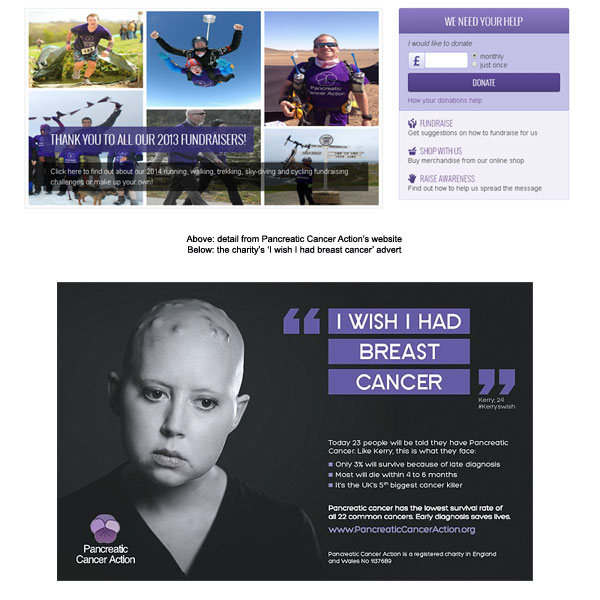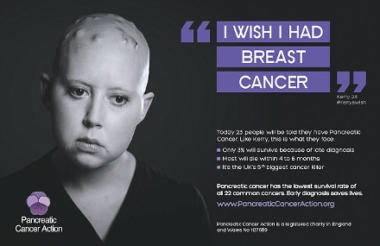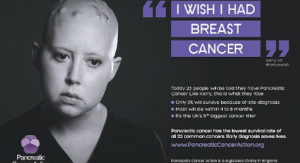The 'I wish I had breast cancer' campaign might be controversial, but it should have also been comprehensive, says Celina Ribeiro.
It might be that you have an opinion about the ‘I wish I had breast cancer’ campaign run by Pancreatic Cancer Action. If you’re a fundraiser, it’s quite likely, actually.
Opinions on the confronting campaign range from disgust to admiration. With survival rates of 3 per cent for those diagnosed with pancreatic cancer, a forceful reaction should perhaps be expected.
Charities shouldn’t descend into ‘my cancer’s better than your cancer’ advertising. Cancer is a horrible disease, and needs both lots of money and awareness to prevent it taking more lives. However, for a small, particularly under-funded and below-the-radar cancer like that of the pancreas, my ire is not drawn by Pancreatic Cancer Action’s advert.
Particularly after the charity’s founder explained the genesis of the campaign; that this is precisely what she felt when she was told she had pancreatic cancer.
It’s a bold campaign. Not nasty, not bitter, not combative. But what I did find disappointing is that the while charity has gone strong on this message, and defended it robustly, the message is absent from its website. The charity has pubilshed in its sidebar responses to the reaction to the campaign, but the campaign itself is invisible. And this, not the campaign itself, is what disappointed me. In for a penny, in for the pound, say I. This is not a campaign that is well served by half-measures.
I don’t think it's a lack of belief or bravery that has stopped Pancreatic Cancer Action seeing this campaign through as an integrated, powerful message behind which the entire organisation is thrown. It’s likely the same reasons that stop many charity campaigns from being integrated and, ultimately, as powerful and impactful as they might otherwise be: a paucity of resource and, possibly, strategy.
Pancreatic Cancer Action believes in this campaign, clearly. I don’t believe it is a vindictive campaign, aiming to take a chunk out of breast cancer’s market or position in public hearts and minds. It does not pit or compare itself, which in its last year on record raised little over £172,000, to Breakthrough Breast Cancer, which last financial year had income of £18.1m. This would have been combative and divisive.
Pancreatic Cancer Action has defended itself well, but that defence would be all the stronger if on a visit to its website, you really, truly understood why some people get the feeling that, when they’re told they have cancer of the pancreas, that they wish it was a cancer with better survival rates.
On the other side of the fence, Breakthrough deserves plaudits for its response. I see that charity’s point also, but what I’m most impressed with is - as pointed out by Paul de Gregorio in his blog yesterday – the way Breakthrough immediately took to the channel which is designed for immediacy and candour - social media - to respond. A quick picture on Facebook - shareable, likeable, engaging – of chief executive Chris Askew and his response to the campaign was the right thing for that charity to do to communicate to its own supporters, many of whom no doubt found the Pancreatic Cancer Action campaign confronting and quite possibly insulting.

Related articles










